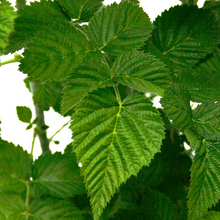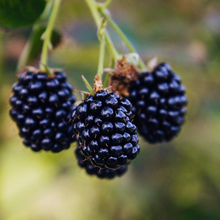Rubus fruticosus 'Apache' is a thornless upright blackberry cultivar prized for its large firm and flavorful berries produced in midsummer. It features high yields on self supporting canes and excellent disease resistance especially against rust and anthracnose. Its compact erect habit makes it ideal for home gardens and small scale fruit production offering both ornamental interest and heavy harvests without the nuisance of thorns.
Height & Spread: 4 - 5 ft x 3 - 4 ft
Bloom Time: Late spring
Light Requirements: Full sun
Soil Preference: Well drained, moderately fertile soil
Watering Needs: Moderate; prefers consistent moisture during fruit set
Deer Resistance: Not deer resistant; protect young canes from browsing
Native Status
Derived from American and European blackberry species, 'Apache' is not a true native plant but performs well in temperate North American gardens.
WILDLIFE & INSECTS
Bees
- Highly attractive to honeybees and native bumblebees during spring bloom.
Butterflies
- Visited by pollinators like Red Admirals and Eastern Tiger Swallowtails for its early nectar supply.
Birds
- Berry clusters attract songbirds such as catbirds, mockingbirds, and robins in summer.
Mammals
- Ripe fruit provides seasonal forage for chipmunks, raccoons, and foxes.
Spacing & Landscape Use
Spacing Recommendations:
- Space 3 - 5 ft apart in rows; allow 6 - 8 ft between rows for air circulation and maintenance.
Landscape Placement:
- Use in edible landscapes, orchard borders, and kitchen gardens where its thornless habit and vertical form are an advantage.
Companion Plants
- Thymus vulgaris (English Thyme) - Aromatic groundcover that suppresses weeds and attracts small beneficial insects.
- Vaccinium corymbosum 'Bluecrop' - Midseason blueberries complement blackberry harvest timing and support pollinator diversity.
- Asclepias tuberosa (Butterfly Weed) - Supports monarchs and other pollinators while thriving in full sun orchard margins.
- Allium schoenoprasum (Chives) - Edging plant that repels aphids and improves biodiversity among cane fruits.
- Rubus idaeus 'Heritage' - A red raspberry that offers extended berry production and beneficial cross pollination in shared orchard rows.



